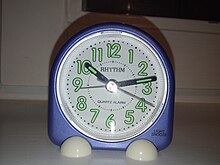Rhythm Watch
This article possibly contains original research. (April 2024) |
 | |
| Formerly | Noson Tokei Seisakujo (1946-1950) Rhythm Watch (1950-2020) |
|---|---|
| Company type | Public |
| Industry | Precision equipment |
| Founded | November 7, 1950 |
| Headquarters | , Japan |
Key people | Hiromi Hirata (chairman) Takeo Yumoto (president)[1] |
| Products | Watches and parts, clocks, emergency broadcast radios, small fans, electronic equipment and parts, multipurpose small cameras, displays for small gauges, precision mold manufacturing, precision parts fabrication, connectors |
| ¥879 million | |
| ¥1,061 million | |
| Total assets | ¥12.37 billion |
Number of employees | 3,292 |
| Website | rhythm.co.jp |
Rhythm Co., Ltd. (リズム株式会社, Rizumu Kabushiki-gaisha) (TYO: 7769), formerly Rhythm Watch until 2020) is a Japanese global corporate group based in Saitama, Japan. The company was founded in 1950 as a clock company and has since expanded globally as a manufacturer of watches, clocks, precision equipment, connectors and small displays. From 1955 until 2003 it was headquartered in Tokyo.[2]
Clocks
[edit]Rhythm was founded as a clock company in 1950 and as such is the most well-known aspect of the company.
Musical and chiming clocks
[edit]In 1987, Rhythm introduced their first musical clocks, the Dream House and the Village Kate (video) under the Citizen brand, which were inspired by cuckoo clocks. In 1988, Rhythm introduced its series of musical clocks under the Small World brand (unrelated to the Disney ride "It's a Small World"). Such clocks from that early time period include the Small World Dual Bell Ringers and the Small World Performing Musicians,[3] which all utilized simple square waves for sound synthesis. By the early 90s, new models used FM synthesis, and a few models were revamped with FM synthesis, with at least some using Yamaha ICs.[4]
-
Dual Bell Ringers clock (released 1989)
-
Story DX (released 1990)
-
Performing Musicians (released 1990)
By 1997, a sound system called Dynamic Wave Sound (DWS) based on Digital waveguide synthesis was released, which had a unique, synth-like tone. By 2003, the Clarion Tone System (CTS) was also released, with a different, glass armonica-like tone, comparable to a blend of bells and organ sounds. In 2006, Rhythm introduced the Super Symphonic Sound (SSS), likely utilizing MIDI. However, it has been said that copyright issues with JASRAC led to the discontinuation of SSS and DWS in 2009, while CTS remains in use.[5]
-
DWS Timecracker (released 1990s-2000s)
-
CTS Nostalgia Light (released 2007)
-
SSS Encore (Released 2007)
In 2019, Rhythm released a new sound system called Creative Sound, blending realistic instruments and synth sounds, alongside Harmonica Sound in the US. However, in the US, clocks with Creative Sound are still labeled as CTS.[citation needed]

Rhythm has also made large scale public automaton clocks.
Other clocks
[edit]Rhythm also makes other clocks such as alarm clocks, cuckoo clocks, and time-only clocks.
-
Rhythm alarm clock
Other products
[edit]Rhythm also sells portable fans internationally. Rhythm sells humidifiers, scent diffusers and waterproof phone and tablet cases in Japan only.
See also
[edit]References
[edit]- ^ "Officer List". Retrieved 2024-01-08.
- ^ "Company History, Rhythm Watch Co., Ltd". rhythm.co.jp. Rhythm Watch Co., Ltd. Retrieved 24 November 2017.
- ^ "家庭用からくり時計(リズム時計) - からくり時計@wiki". 家庭用からくり時計(リズム時計) - からくり時計@wiki (in Japanese). Retrieved 2023-12-16.
- ^ "『① 修理前点検 11台目 RHYTHM 音楽隊 新音源 からくり時計 リズム 4MH638 修理』". 福岡県 遠賀郡 芦屋町 川村時計メガネ店 一級眼鏡作製技能士 ブーンのブログ (in Japanese). Retrieved 2023-12-24.
- ^ Kearney, Christine. "Paul Simon sues Japanese clockmaker for using song".
External links
[edit]- Rhythm Watch Co., Ltd. (official website)
- Rhythm Watch Co., Ltd. Official YouTube channel
- Manufacturing companies established in 1950
- Japanese companies established in 1950
- Multinational companies headquartered in Japan
- Manufacturing companies based in Tokyo
- Watch brands
- Watchmaking conglomerates
- Electronics companies of Japan
- Watch manufacturing companies of Japan
- Companies based in Saitama Prefecture
- Companies listed on the Tokyo Stock Exchange
- Japanese brands
- Nishitōkyō, Tokyo







